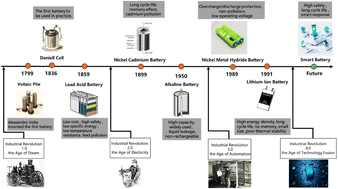Lithium-ion batteries are a very important energy storage device, which has led to a wide range of applications and excellent performance making them important in many industries. However, the development of rechargeable batteries has been slow in recent decades due to the inherent properties of the material. With the advent of the fourth industrial revolution, the development of high technology, such as artificial intelligence, is changing rapidly. The development of smart batteries is an effective strategy to improve battery life and operational safety by integrating smart concepts into battery design, manufacturing and management. This review comprehensively describes the current development of smart batteries. Based on different perspectives of battery design, manufacturing and management, smart batteries can be divided into three parts: smart materials, smart manufacturing and intelligent sensing. The mechanism of action and application principles of each part are also discussed in detail for in-depth understanding. In addition, we have analyzed the challenges and issues facing the development of smart batteries to facilitate their practical development.
